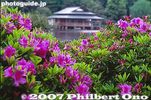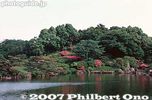 Image search results - "kiyosu" Image search results - "kiyosu" |

Entrance to Kiyosumi Teien Gardens. Admission 150 yen.
|
|

This garden is very green. Even the pond is deep green. Kiyosumi Garden is classified as a "kaiyu-shiki teien" (回遊式庭園) or "circular-strolling Japanese garden." It's a common and classic Japanese garden design where you simply walk around the garden, usually around a central pond.
|
|

Iwasaki Yataro, the founder of the Mitsubishi Zaibatsu, acquired the estate in 1878 and developed the garden with a pond and famous stones brought from all over Japan.
|
|

Many matsu pine trees and many stones.
|
|

Stepping stones, called Isowatari, are another major feature of the garden.
|
|

Stepping stones, called Isowatari. 磯渡り
|
|

Isowatari. 磯渡り
|
|

Isowatari. 磯渡り
|
|

Azalea bushes and Ryotei teahouse
|
|
|

Pine branches and azaleas
|
|

Red and white azaleas
|
|

Ryotei teahouse 涼亭
|
|

Huge and hungry carp
|
|

In case you fall into the pond...
|
|

Taisho Memorial Hall
|
|

Big flower
|
|
|

Bridge to a small island and gazebo
|
|

Gazebo on one of the three islands in the pond. あずまや
|
|
|
|
|

"Mt. Fuji" with azalea bushes blooming in early May.
|
|
|
|
|
|

Tiny flowers
|
|

Famous stone
|
|
|
|
|
|

Bird
|
|

Stone buddha
|
|

Playground
|
|

Iris garden
|
|

Basho Haiku Monument written with the famous haiku of the frog jumping into the pond. 芭蕉の句碑
|
|

Ryotei teahouse 涼亭
|
|

Wisteria
|
|

Ryotei teahouse 涼亭
|
|
|

Kasa-tei 傘亭
|
|
|

Irises
|
|
|

Pine tree and Ryotei
|
|

Pine tree and Ryotei
|
|
|

Stone pagoda on island named Matsushima
|
|

Stone lantern
|
|
|

JR Kiyosu Station platform. Note that only the local (kaku-eki) trains stop at Kiyosu Station. The kaisoku express trains don't stop at Kiyosu.
|
|

JR Kiyosu Station on the JR Tokaido Line between Nagoya and Gifu.
|
|

Inside JR Kiyosu Station
|
|

JR Kiyosu Station on the Tokaido Line. There is a sign pointing the way to Kiyosu Castle, a short walk from the train station.
|
|

Along the way, you come across this small Kiyosu Castle Park with a low mound. This is the original location of Kiyosu Castle. 清洲古城公園
|
|

A little shrine at the spot of the original castle tower.
|
|
|
|

Stone marker indicating the original location of Kiyosu Castle as occupied by Oda Nobunaga.
|
|

From the castle park, you can see this red Otebashi Bridge leading to the rebuilt Kiyosu Castle.
|
|

The red bridge makes it quite picturesque, even though the castle tower is reconstructed in April 1989.
|
|

Kiyosu Castle, Aichi Prefecture. Oda Nobunaga moved to Kiyosu Castle from Nagoya Castle in 1555. From Kiyosu Castle, he went to defeat the Imagawa at the Battle of Okehazama.
|
|

After Nobunaga died, his second son Nobukatsu occupied the castle and he expanded it in 1586. When Tokugawa Ieyasu made Nagoya the capital of the region in 1610, Kiyosu fell into obscurity. Parts of Kiyosu Castle were used to build Nagoya Castle.
|
|

From the shinkansen bullet train and Tokaido Line train, you can see the castle. The four-story ferro-concrete castle tower houses a local history museum.
|
|

Kiyosu Castle was also where the Kiyosu Conference was held by Hideyoshi and other Oda generals to decide who would succeed Nobunaga after his assassination.
|
|

Gate to Kiyosu Castle. It was during New Year's so the kadomatsu pine decorations flank the entrance.
|
|

Kadomatsu pine decoration
|
|

Kiyosu Castle
|
|

In front of the castle tower is a rock garden.
|
|

Kiyosu Castle tower and rock garden.
|
|
|

Kiyosu Castle tower and rock garden. 300 yen admission for the castle tower. Open 9 am to 4:30 pm. Closed Mon. (open if a national holiday).
|
|

Store house
|
|
|
|

Rock garden
|
|

The first floor of the castle tower shows some samurai armor.
|
|

Samurai armor in Kiyosu Castle.
|
|

Noh masks
|
|

Matchlock gun
|
|

The 3rd floor shows more feudal-era artifacts and a model of the golden shachi roof ornaments which Kiyosu Castle was famous for. The original shachi are now preserved at Sofukuji temple in Gifu.
|
|
|

Matchlock gun
|
|

Matchlock gun bullets of various sizes.
|
|

Kiyosu Castle's 2nd floor includes this mannequin setup showing Oda Nobunaga and his cohorts.
|
|

Kiyosu Castle's 2nd floor includes this mannequin setup showing Oda Nobunaga and his cohorts.
|
|

This scene shos Oda Nobunaga going off to battle at Okehazama to defeat Imagawa.
|
|
|

Oda Nobunaga
|
|

Woman playing the tsuzumi shoulder drum.
|
|
|
|

The other side of the 2nd floor shows rock-dropping slits in the floor.
|
|
|

Rock-dropping slits in the floor.
|
|

The 4th floor is the top floor with a lookout balcony.
|
|

Statue of Nobunaga on the 4th floor.
|
|

On the 4th floor balcony. The views are good, but not so pretty with factories and other buildings all around.
|
|

Rock garden below and shinkansen passing by.
|
|
|
|

Rock garden
|
|

Shachi roof ornament
|
|
|

Looking toward the Kiyosu Castle Square behind the castle.
|
|

Mt. Ibuki in the distance.
|
|

Nagoya in the distance.
|
|
|

Banners
|
|

Next to the castle tower is the Geino Bunkakan or Culture Hall for events and meetings. It is designed like a palace. You go through here when exiting the castle tower.
|
|
|

Kiyosu Castle
|
|

Kiyosu Castle from behind.
|
|

Kiyosu Castle's rock-dropping slits.
|
|

Kiyosu Castle's rock-dropping slits.
|
|

Statue of Princess
|
|

Furusato no Yakata rest house and gift shop.
|
|

Inside Furusato no Yakata rest house.
|
|

Near Kiyosu Castle is Kiyosu Park.
|
|

Kiyosu Park where there is this statue of Oda Nobunaga.
|
|

Statue of Oda Nobunaga at Kiyosu Park, Aichi.
|
|

Also in the park are war memorials.
|
|

Also nearby is the site of the Honjin main lodge of Kiyosu-juku along the Mino Kaido Road. 清洲宿本陣
|
|

Gate of the Kiyosu-juku Honjin. Behind it is a modern private house. The Honjin was the exclusive lodge of VIPs traveling through.
|
|

Marker indicating that Emperor Meiji once stopped here.
|
|
|

Kiyosu Castle
|
|

Kiyosu Castle as seen from the train on the Tokaido Line going to Nagoya.
|
|
|
|



























































































































